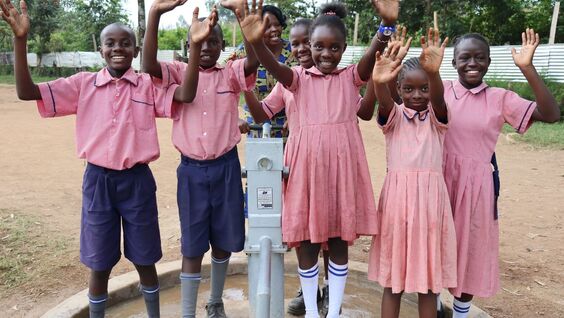St. Gerald Sasala Primary School
Project Complete!
The school has a seasonal hand-dug well that has difficulty keeping up with such a large population, especially during the dry season when the water table is low. Inevitably, the well goes dry, and students are forced to bring water from home. It doesn't matter if students want the burden of carrying heavy water containers to school. It is expected of them.
"The current water situation affects me a lot. On the other hand, I was beaten by the teacher on duty because of coming late to school after I had gone to look for water to carry to school," said 12-year-old student Thedaus K. (shown above).
Collecting water in the morning before school makes students late, and sadly, the water they bring with them is questionable at best because they collect it wherever they can find a pool of water. Often, that means the closer and quicker the collection, regardless of the source, is where students fill their containers. One container of contaminated water is all it takes to taint the whole, so consuming this water from unknown sources is risky for everyone.
"The water brought from various sources is not safe for human consumption. Most of the pupils are found with typhoid and stomach ache, which makes them miss some lessons. On the other hand, the cost of treatment and medication is high. When the pupils miss some lessons, it affects the performance of pupils individually and collectively lowers the ranking of the school," reported field officer Mary Afandi.
"When the water is finished, which the pupils carry from home, it forces them to come out of their classes and go look for water outside the school. This break from their lessons interferes with their studies and causes them to drop in their performance academically," continued Mary.
When the water in the well and what students brought with them in the morning runs out, they must walk to an overcrowded community spring (see above) that is in disrepair to collect more, even amidst their school day. All this time outside the classroom is detrimental to everyone because it steals the time and energy needed for learning.
"Personally, I have been affected a lot because I can't finish my syllabus on time or lessons because looking [for] water [in the] daytime interferes with my lessons," said 36-year-old headteacher Mary Asenwa, shown below near the spring.
Installing a borehole well will enable students like Thedaus and teachers like Mary to access water whenever needed throughout the year, right outside their classrooms, instead of wasting valuable learning time. Hopefully, in a short time, consuming clean water will give everyone the energy and health they need to focus on learning instead of battling water-related illnesses.
New Well
We conducted a hydrogeological survey at this school and the results indicated the water table beneath it is an ideal candidate for a borehole well. Due to a borehole well's unique ability to tap into a safe, year-round water column, it will be poised to serve all of the water needs for this school's large population, even through the dry months.
The school will help collect the needed construction materials such as sand, rocks, and water for mixing cement. They will also provide housing and meals for the work team, in addition to providing local laborers. We will complement their materials by providing an expert team of artisans and drilling professionals, tools, hardware, and the hand-pump. Once finished, water from the well will then be used by the school's students and staff for drinking, handwashing, cooking, cleaning, and much more.
Handwashing Stations
The student health club will oversee the two new handwashing stations we will provide, and make sure they are kept clean and in working condition. The club leaders will fill the handwashing stations with water daily and make sure they are always supplied with a cleaning agent such as soap or ash.
VIP Latrines
We will construct two triple-door latrine blocks using local materials that the school will help gather. Three doors will serve the girls and three doors will serve the boys. All of these new latrines will have cement floors that are designed to be easy to use and to clean. And with a borehole right on school property, there should be enough water to keep them clean.
Training on Health, Hygiene, COVID-19, and More
We will hold a one-day intensive training session with students, teachers, and parents. This training will cover a wide range of topics including COVID-19 symptoms, transmission routes, and prevention; personal and environmental hygiene; and the operation and maintenance of the borehole, latrines, and handwashing stations. There will be a special emphasis on handwashing.
H2O for Life partners with experienced NGO organizations around the world that build and support clean water, sanitation, and hygiene education projects in schools. These NGO partners cover half the total cost of every project funded through H2O for Life.
When students raise money for a project, 90% of the funds go directly to the project, and 10% supports the work that makes the project possible. This includes choosing trusted partners, managing funds responsibly, checking on projects, and reporting back so students can see the impact of their work.
This helps ensure every project is done well, stays sustainable, and truly changes lives.
In rare situations, we reserve the right to reallocate funds to alternate project(s).
Questions? Ask us at 651-756-7577 or info@h2oforlifeschools.org.






























